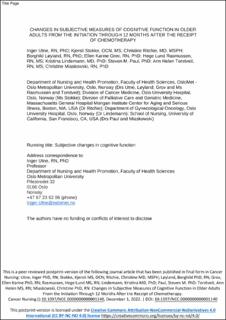Changes in subjective measures of cognitive function in older adults from the initiation through 12 months after the receipt of chemotherapy
Utne, Inger; Stokke, Kjersti; Ritchie, Christine Seel; Løyland, Borghild; Grov, Ellen Karine; Rasmussen, Hege Lund; Lindemann, Kristina Yvonne Kathe; Paul, Steven M; Torstveit, Ann Helen; Miaskowski, Christine
Peer reviewed, Journal article
Accepted version
Permanent lenke
https://hdl.handle.net/11250/3051431Utgivelsesdato
2022-12-01Metadata
Vis full innførselSamlinger
Originalversjon
https://doi.org/10.1097/NCC.0000000000001140Sammendrag
Background: Cognitive impairment has a negative impact on older patients with cancer.
Objective: Evaluate for inter-individual differences in two subjective measures of cognitive function in older patients (n = 112), as well as determine which demographic, clinical, and symptom characteristics, and levels of physical function, were associated with initial levels and with the trajectory of each of these two measures.
Methods: Cognitive function was assessed using the cognitive function scale from the European Organization for Research and Treatment of Cancer Core Quality-of-Life Questionnaire (QLQC30 CF) and the Attentional Function Index (AFI) at the initiation of chemotherapy and at 1, 3, 6, 9, and 12 months after its initiation. Hierarchical linear modeling was used to assess for interindividual differences in and characteristics associated with initial levels and changes in cognitive function.
Results: Characteristics associated with decreases in QLQ-C30 CF scores at the initiation of chemotherapy were longer time since the cancer diagnosis and higher depression scores. Characteristics associated with poorer AFI scores at enrollment were lower levels of education and higher depression scores. No characteristics were associated with worse trajectories of either cognitive function measure.
Conclusions: Some older patients undergoing chemotherapy experience decrements in cognitive function.
Implication for practice: Our findings suggest that clinicians need to assess for depressive symptoms in older patients prior to the initiation of chemotherapy. Evidence-based interventions (e.g., cognitive stimulation, increased physical activity) can be recommended to maintain and increase cognitive function in older oncology patients.

